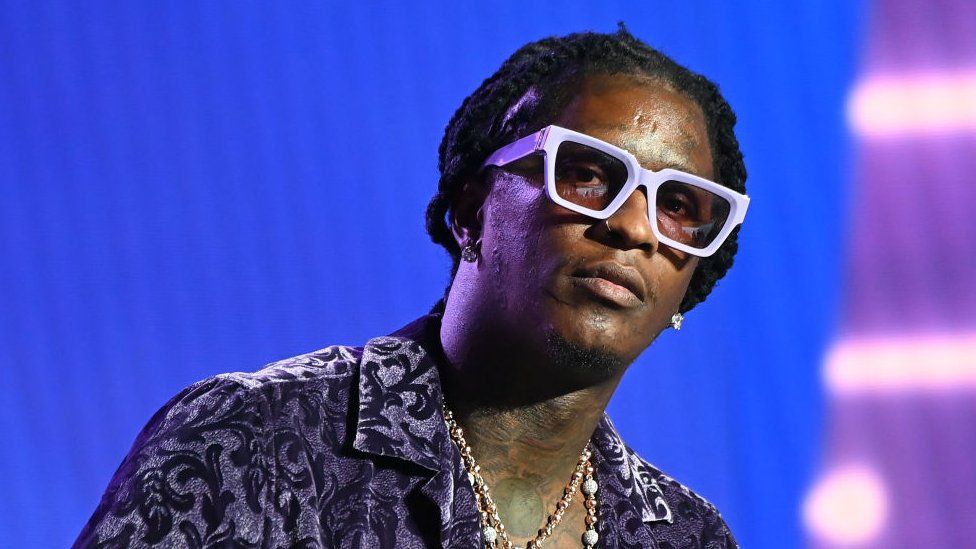
Young Thug’s lyrics used against him as gang trial starts

By Jessica Murphy & Max Matza
BBC News
Rapper Young Thug’s racketeering trial has begun with Georgia prosecutors accusing him of being a gang leader in charge of a “wolf pack”.
The Atlanta rapper, born Jeffery Lamar Williams, is accused of co-founding a violent street gang in his hometown.
Prosecutors are using the critically acclaimed performer’s own lyrics as evidence against him.
The rapper is accused of racketeering – the same charge facing ex-US President Donald Trump in the state.
Mr Williams, 32, has been in jail since his May 2022 arrest on charges that also include participating in criminal street gang activity.
Fulton County Deputy District Attorney Adriane Love told the jury the rapper oversaw dozens of crimes that left a “crater” in Fulton County. That crater “sucked in the youth, innocence and even the lives of some of its youngest members”, she alleged.
In Monday’s colourful opening statement, which was interrupted several times by defence attorneys, Mrs Love said that Mr Williams’ lyrics “bore a very eerie significance to real life” and the crimes the gang is alleged to have committed.
Her opening statement included portions of lyrics, including one from another allegedly associated gang member referring to a murder.
“We didn’t chase any of the lyrics to solve any murders,” she said. “Law enforcement in Fulton County chased the murders and found the lyrics.”
Prosecutors in Fulton County argue that the rapper’s music label YSL is not a true business, despite its success at producing Grammy-winning talent. Instead, they allege, it is a street gang affiliated with the US-based Bloods gang.
In an indictment in May, the district attorney’s office alleged the YSL co-defendants were linked to offences including murder, armed robbery and carjacking.
Mrs Love said that the group “moved like a pack” that “had an agreement – unspoken, but no less an agreement” to obtain “things of value” and property through illegal activity.
If found guilty, Mr Williams could face decades in prison.
The opening day of the trial, however, was marred by repeated objections, delays and a call for a mistrial, prompting Judge Ural Glanville to remark that he is “not happy about this”.
Georgia prosecutors used the Racketeer Influenced and Corrupt Organizations (Rico) Act – famously used in mafia prosecutions – to charge the rapper and 27 associates who were allegedly involved in the criminal enterprise at various levels.
Fulton County prosecutors also cited the Rico Act to build a case against Mr Trump and 18 co-defendants, alleging they “unlawfully conspired” to change the 2020 election outcome as part of a “criminal enterprise”.
Neama Rahmani, a trial lawyer who is closely watching both cases in Fulton County, says that if prosecutors can win their case against YSL, they are more likely to succeed in prosecuting Mr Trump and his alleged co-conspirators.
The challenge, he says, is that “organisation” under the Rico law is “really loosely defined”. In both YSL and the Trump campaign’s case, prosecutors are wading into “uncharted waters”, Mr Rahmani says, as it is unclear whether they will meet the legal standard.
Prosecutors say they plan to call up to 400 witnesses in Mr Williams’ trial to clarify the “organisation” at its centre. Popular rappers such as Killer Mike, Lil Wayne, and TI could be among those set to testify.
The trial, which is expected to last around six months, is part of an investigation that prosecutors said has been ongoing for about 10 years.
During that period, Young Thug – who co-wrote the Donald Glover song This is America – has been a growing force in hip-hop.
This month Judge Glanville ruled that prosecutors would be allowed to use some of Mr Williams’ rap lyrics as evidence that crimes had been committed by the defendants.
That lyrics from his songs are being used as evidence in the case has raised questions about free speech, artistic expression and racial bias, but prosecutors dismissed those arguments.
Source: https://www.bbc.co.uk/news/world-us-canada-67527707?at_medium=RSS&at_campaign=KARANGA















